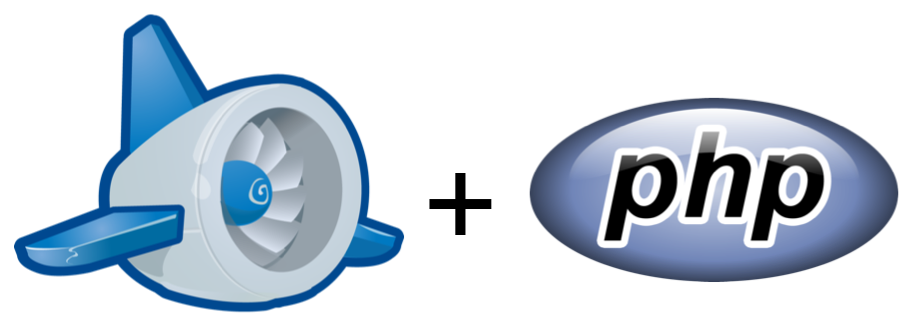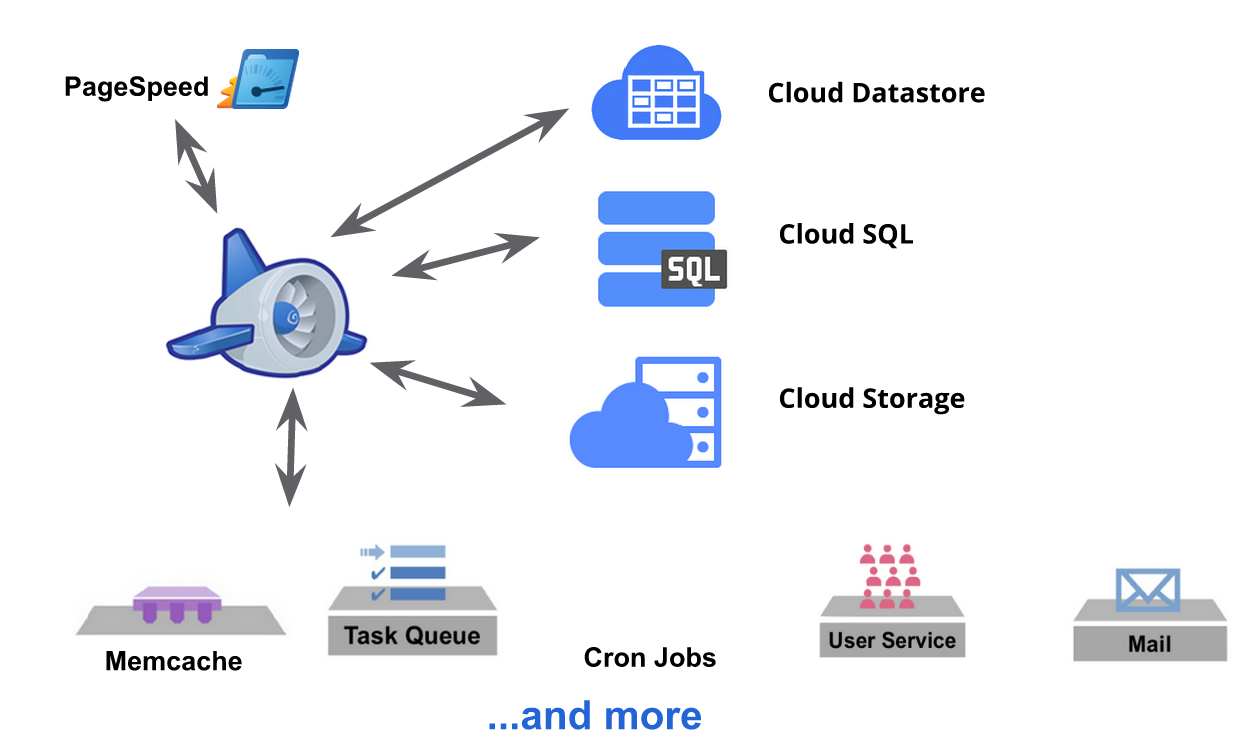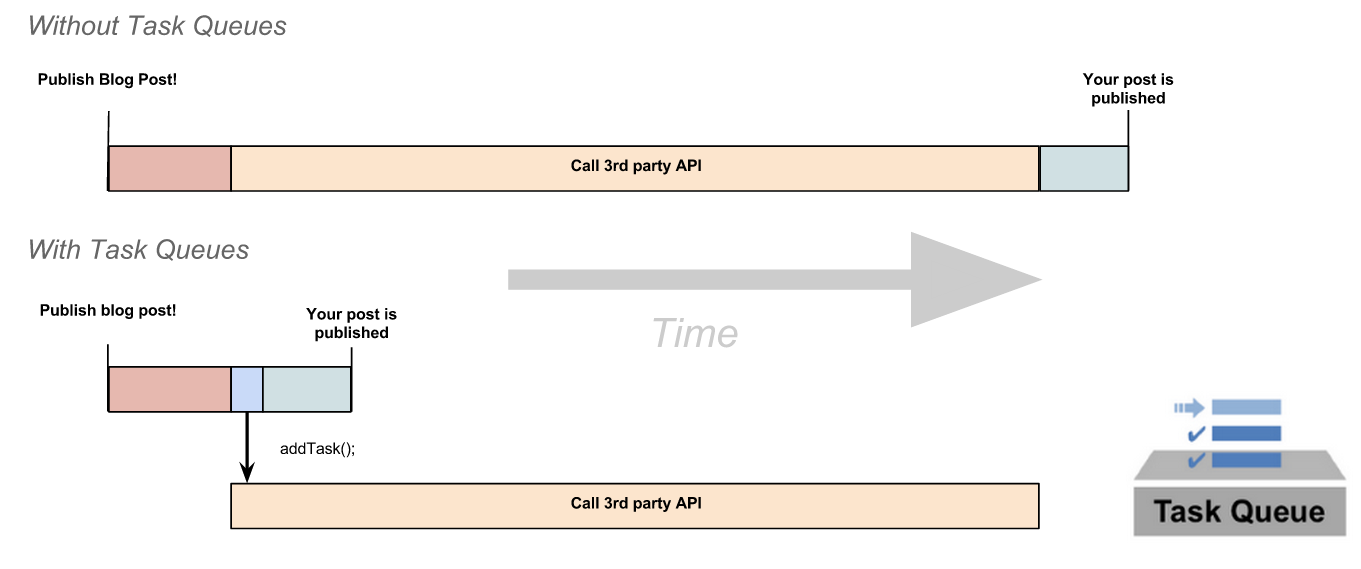

@amygdala
http://plus.google.com/+AmyUnruh
PHP on App Engine

In Preview, open signups!
Google Cloud Platform Starter Pack
Google Cloud Platform Starter Pack allows developers from affiliated partners to receive $2,000 of credit - $1,000 for Google App Engine and $1,000 for Cloud Platform services like Cloud SQL.
Apply at http://goo.gl/0YjkLQ
(cloud.google.com/starterpack)
Use promo code amyu-in.


WordPress on App Engine
Easy to deploy and manage your apps:
- Scales automatically
- Powerful background processing
- Managed Cloud SQL
- Managed services and APIs- preconfigured and ready to use
- Security benefits
Roadmap
- What is App Engine and the Cloud Platform?
- Getting started with PHP on App Engine
- WordPress on App Engine (walkthrough and demos)
- if time... using Task Queues with WP
Google Cloud Platform
App Engine

PHP on App Engine
PHP on App Engine

github.com/GoogleCloudPlatform/appengine-php
http://php-minishell.appspot.com/phpinfo: Production phpinfo()
App Engine APIs and Services

Migrating a typical PHP app to App Engine
- Create an AppEngine application, configure
app.yamlandphp.ini - Use http streams for network calls
- Mail API for sending mail
- Google Cloud SQL as production SQL database, Google Cloud Datastore for NoSQL datastore
- Google Cloud Storage for file system writes/uploads (there is a GCS stream wrapper)
- Memcache service for cache
- Cron, task queues for background jobs


→ Scalable apps and asynchronous processing made easy
Walkthrough:
Let's put a WP app on App Engine
Set up the Cloud Platform components you're going to use
- Create an app engine app and associated cloud project
- In the project, create a cloud storage 'bucket' (for media uploads)
- In the project, set up a Cloud SQL instance (for a SQL database)
- Enable billing (use the starter pack credits!)
Useful links:
- The Cloud Console: https://cloud.google.com/console
- Directly go to your App Engine apps: https://appengine.google.com/
- https://developers.google.com/appengine/docs/php/
Set up your local development/testing enviroment
- Set up your local runtime environment
- Grab the App Engine SDK and launcher
Configure your app
- app.yaml, php.ini, wp-config.php
- The WordPress getting started repo: https://github.com/GoogleCloudPlatform/appengine-php-wordpress-starter-project
(http://goo.gl/Tkk5rI) - WordPress 'getting started' article: https://developers.google.com/appengine/articles/wordpress
- App Engine WordPress plugin
Portion of app.yaml file
application: your-app-id
version: one
runtime: php
api_version: 1
handlers:
- url: /(.*\.(htm$|html$|css$|js$))
static_files: wordpress/\1
upload: wordpress/(.*\.(htm$|html$|css$|js$))
application_readable: true
...
- url: /wp-admin/(.+)
script: wordpress/wp-admin/\1
secure: always
- url: /wp-cron.php
script: wordpress/wp-cron.php
login: admin
- url: /wp-(.+).php
script: wordpress/wp-\1.php
- url: /(.+)?/?
script: wordpress/index.php
Test locally, install plugins
A note about plugin installation...
<path_to_sdk>/dev_appserver.py --php_executable_path=<path_to_php-cgi54> .
Deploy!
- via the launcher and appcfg.py
- git push-to-deploy
Explore the App Engine Admin Console (dashboard, logs, task queues, versions and traffic splitting, and much more)
Resources
- These slides: http://goo.gl/vxqe7y, http://sydwp.amy-slides.appspot.com/
- 'Unofficial' GAE PHP Tips Blog: https://gae-php-tips.appspot.com/
- The I/O session talk
- Documentation: http://developers.google.com/appengine/docs/php/
- Using PHPStorm with the App Engine Plugin
- Cloud Platform Blog: http://googlecloudplatform.blogspot.com
Google Cloud Platform Starter Pack
Google Cloud Platform Starter Pack allows developers from affiliated partners to receive $2,000 of credit - $1,000 for Google App Engine and $1,000 for Cloud Platform services including Cloud SQL.
Apply at http://goo.gl/0YjkLQ.
(cloud.google.com/starterpack)
Use promo code amyu-in.


App Engine Task Queues
- Define tasks and process them asynchronously, in the background
- App Engine automatically scales processing capacity
- matches your queue configuration and processing volume.
Task Queues

Adding A Task to a Queue
Tasks are HTTP request handlers.
require_once 'google/appengine/api/taskqueue/PushTask.php';
use \google\appengine\api\taskqueue\PushTask;
...
$task_params = ['message' => $message, 'to' => $people];
$task = new PushTask('/sms_notify.php', $task_params)->add();
$task->add();
A Task Handler
require_once 'google/appengine/api/taskqueue/PushTask.php';
use \google\appengine\api\taskqueue\PushTask;
...
$task_params = ['message' => $message, 'to' => $people];
$task = new PushTask('/sms_notify.php', $task_params)->add();
$task->add();
The /sms_notify handler script:
<?php $message = $_POST['message']; $to = $_POST['to']; // in the handler, notify based on the params // ....
Define the handler in your app.yaml file
handlers: ... - url: /sms_notify script: sms_notify.php login: admin
- Task handlers are always run as 'admin'
- You can use regexps in your app.yaml file, e.g.
- url: /(.+)_task
script: /\1_task.php
login: admin
Task Queues and WordPress hooks: made for each other
add_action('publish_post', 'launchNotificationTasks');
add_action('save_post', 'schedulePublishTask');
<Thank You!>
